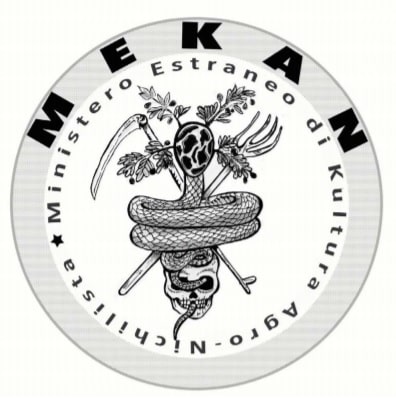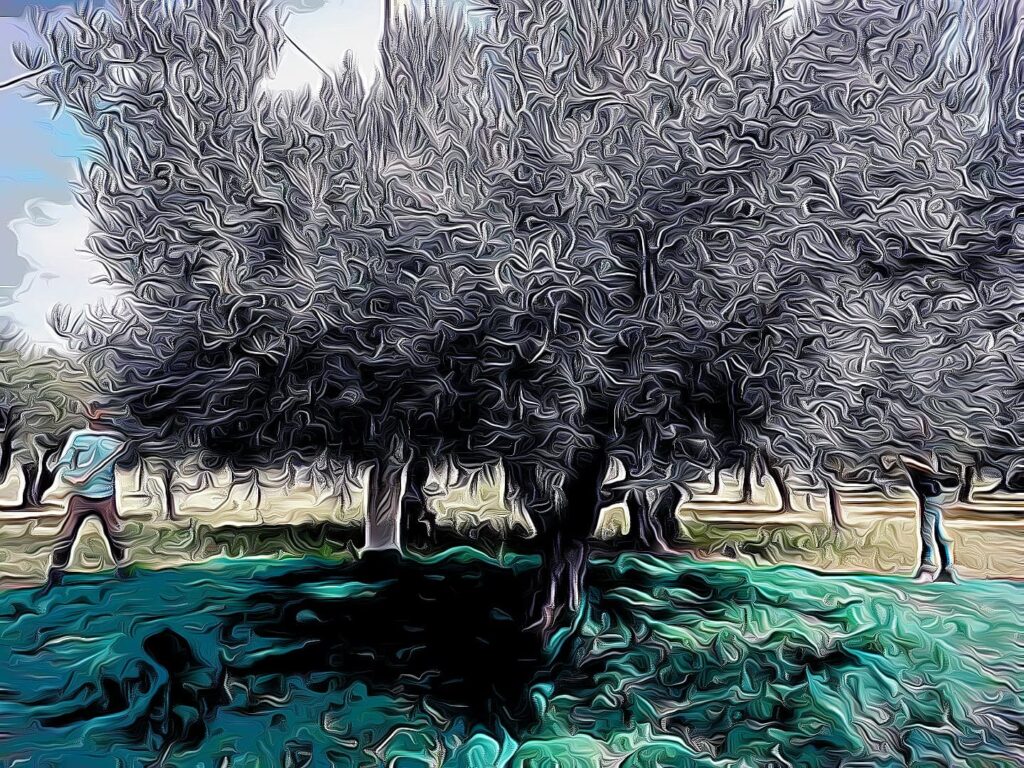The name “agro-nihilism” came about as a joke between friends while we were starting to organize our life on the land at Ekidna. I’m pretty sure that some of us started using the term “nihilism” to mark a departure from their previous infatuation with the obscene pleasures of the urban economy: with bohemian life, with flaneuring, “derives” or travelling, with everything “radical”, “engaged”, underground or avant-garde, with the city in general. We spent that summer joking about it and “No one said agro-nihilism would be easy” became the standard reply whenever one of us had something to complain about. But after a while, those of us still living on the land have decided to stick to this identity, or let it stick to us, because we saw that, beyond its comical potential, it can also slightly disturb; and we do like unsettling comedy.
In my – meagre – experience, contemporary nihilism is not free of arrogance, individualism, militarism and machismo, in a word, of phallic ecstasies; it therefore runs the risk of calcifying into an ultraorthodox dogma that rejects every other kind of political experiment as being “too civil”. However, I find it amusing to morph something as humourless and self-important as “nihilism” into something self-ironic and ambivalent and, in this form, to harness it to my own projects. This mutant nihilism aims to be fluid, jolly, playful and gregarious and leaves behind the carceral Luna Park of the city to invent games about autonomy on the land. So, here it is: “agro-nihilism”.
- A philosopher called Zizek argued that a crack in the dominant reality happens when, in a situation when they are forced to make a choice, the subject does not go for any of the available choices but for something else, for a choice that initially seems impossible. This “impossible choice” is the one that changes the coordinates of the situation, the framework of what is possible, opening completely new horizons. Zizek illustrates this “impossible choice” with a scene from the 1990s film “The Usual Suspects”, the shocking moment when Kayser Soze, blackmailed by enemies that are holding his family at gunpoint, actually shoots his family himself; and then dedicates his life to going after his enemies and eliminating them all. The idea would be that by cutting loose from the precious object used by the enemy to keep them in check, the subject gains the space of free action. Of course, such an act would also radically redefine who you are. My agro-nihilist “impossible choice” is nothing shocking; much more modest than Soze’s, it simply involves cutting loose from the enjoyable and addictive urban economy and from the equally enjoyable duty of saving and perfecting society (or the world). In the messianic activist scenario, the enemy – State, capitalism, colonialism, the bourgeois economy, you name it – holds “society”, the “oppressed” and the “future” in their grip and blackmails us using this prisoner. This scenario keeps us in a state of panic and impotence that usually leads to bitterness, exhaustion or capitulation (“burn-out”). Renouncing this precious object (“society, the world, the oppressed,” etc.) and with it the identity of “saviour” that subtends most revolutionary dreams became for me the pre-condition for opening a crack in reality where exciting experiments in “being otherwise” can take place. So, “society” will not and should not be protected. Indeed, once one understands that “society” is a fundamental governing dispositif of modernity, they can only be “anti-social”. This anti-social stance liberated me from the hopes, duties and guilt related to performing “useful”, “relevant” and “successful” actions. It forced me to give up the prophetic fantasies of enlightening and guiding the “masses” and the self-serving efforts of “making the world a better place” through actions inspired by the Western genealogy of revolutionary action, “social progress”, religious charity, aristocratic “noblesse oblige” or liberal-capitalist assistentialism.
- As an agro-nihilist, I accept that my actions might not have a lasting or significant impact on the trajectory of bourgeois order towards increasing mass docility and that they will not single-handedly “bring down” the bourgeois regime. The way I see it, the bourgeois order will keep moving towards perfecting “respectful concentration camp” governing techniques and towards further genocides. The only honest justification for my actions is that they give me ecstasy; but the fundamental difference with the loyal citizens, the element that makes my agro-nihilism antagonistic, is that I understand that my ecstasies are political that is, are produced by various governing dispositifs and have effects on the reproduction – or not – of dominant reality. And thus, as an agro-nihilist I take responsibility for my enjoyment (even when it’s not my fault) and try to act upon it. … Inventing counter-bourgeois life-forms and practices of enjoyment is my horizon of fantasy. I know, easier said than done. But no one said agro-nihilism would be easy…
- As an agro-nihilist, I also give up the righteous pleasure of reacting to faraway liberal-capitalist violences. The spectacular Western European solidarity with the struggle of other people cannot but involve consumption, appropriation and, at the end of the day, hypocrisy. I am constantly admiring other people’s struggles and feel inspired and galvanized by them; but that does not mean I can be a part of them from my territory in the core of the European colonialist-capitalist stronghold.
- My agro-nihilism leaves behind the suffocating confines of consensus reality, that is, the duty to consult with the most conservative members of society so as not to put at risk their lives or to threaten the current order of things (for the discussion of consensus reality that inspired this stance, including the dilemmas related to critiquing “consensus” while it still constitutes a political pillar of our anti-patriarchal struggles, see Crimethinc’s “Terror Incognita”).
- As an agro-nihilist I maintain the classical nihilist disdain for heroes, leaders, institutions, moral codes, social order, dominant apparatuses of knowledge-creation and truth-ascertaining, for grand political teleologies, liberal democracy, pre-scripted political principles and for the games, tropes and traps of bourgeois ecstasy. In fact, agro-anomism might have been a better term, since what I contest is the nomos itself; but it’s less catchy.
- As an agro-nihilist I know that there is no “ultimate discovery”, “growth”, “blooming” or “personal” resolution when “selfhood” is concerned. The self-contained, unitary, coherent and unchanging self is a fantasy; what we call the “self” is actually a constant, cyclical move between nodes of anxiety and ecstasy that we only dimly understand. Agro-nihilism tries to navigate this nodal archipelago without smashing its pirate boat on the rock of trauma and without remaining stuck in the libidinal whirlpools we have inherited from our parents and educators.
- Agro-nihilism exits the economy of relevance and visibility of contemporary capitalism. If nothing of what we do can be used for making bourgeois society a better place; for being broadcasted on the screens of the Spectacle; or for turning ourselves into “better people” according to the bourgeois codes of worth, then our agro-nihilism can be considered a success.
Ministero Estraneo di Kultura Agro-Nichilista



